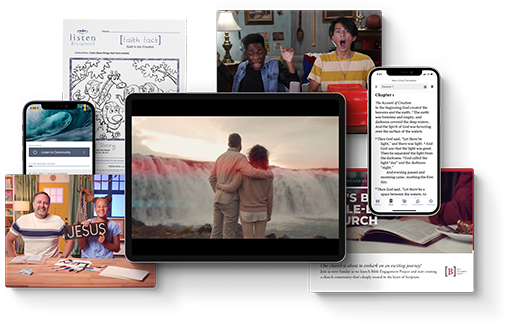Equipping the Local Church to Disciple Well
By Renée Griffith | Posted In Ministry Tools
Bible Engagement Project sat down with Elly Marroquin, the AG national director for Christian Education and Discipleship, to hear seven ways that local churches can infuse their culture with a high level of Bible engagement. Elly and her husband Sergio planted a church in Garfield, New Jersey where they pastored for 19 years. Prior to Elly’s appointment at the national office, she served as the Christian Education director for the Spanish Eastern District of the Assemblies of God.
BEP: Explain the function of the Christian Education and Discipleship office in relation to the AG fellowship’s other ministry departments.
Elly: First, discipleship is not just an office or a department to me: it is a calling to follow Jesus—one that I believe begins even before conversion. Discipleship is a lifelong intentional and strategic process for all ages and stages of life, so this office exists to explore the ways that the different ministries can interconnect to serve churches and individuals. At the core, this office aims to resource and equip local churches and actively seeks to combine efforts with the other ministries to support the disciple-making process.
BEP: Tell us more about your definition of a disciple and of discipleship as a lifelong process.
Elly: Absolutely. Discipleship is not a program; it is the core of the church – it is our mission! it’s not a multi-week series on following Jesus. Rather, it’s a journey that starts when you begin opening up your heart and mind to Jesus, and it’s a journey that lasts a lifetime.
The mandate for discipleship (Matthew 28:18-20) is ultimately about making disciples. It is two-fold encompassing transformation and multiplication. Transformation is the work of the Holy Spirit. We are incapable of achieving true lasting transformation without Him. As we engage God’s Word, our relationship with Jesus deepens. Moreover, genuine, meaningful relationships with committed believers helps us grow. The other component, multiplication is essential in a disciple making culture. Sheep multiply! Thus, disciples are called to teach others and make other disciples.
A disciple, by definition, is a learner. In our context, this is someone who learns to discern God’s voice and distinguish truth from lies. This is critical among a culture that doesn’t believe that truth is found in God’s Word. A disciple yearns for Christlikeness and manifests the fruit of the Spirit. A disciple is committed to learning God’s will and living it out regardless of the cost. We all have different callings, and there are so many giftings among the body of Christ: we have to be okay with following as part of discipleship, with being the pinkie finger, so to speak, rather than the whole hand or foot. A disciple is the best at what he or she is called to be, whatever that is. However, in whatever we do, our primary assignment is to make disciples of others for Jesus.
BEP: What is the extent of the interaction, or partnership, between Discipleship and BEP?
Elly: The Bible Engagement Project, which focuses seeks to have people engage with the Bible and have a relationship with the God of the Word, is an integral part of discipleship. The Bible is our core/ foundation.
Christian Education and Discipleship share common goals with BEP, so we are partnering together to create a local church culture where people are highly engaged with Scripture. Our office focuses on training Christian leaders and curating resources for spiritual formation within the local church.
I’m a huge proponent of collaboration, and I believe that we certainly do greater work for the Kingdom together—that is, when the ministries work together to resource local churches, we are all bringing our giftedness to the table and reaching more people more effectively.
BEP: What advice do you have for district-level Christian Education and Discipleship leaders for creating a church culture that is saturated with the Word of God / marked by a hunger for the Word of God?
Elly: First, approach God’s Word daily with a posture of expectancy. The Bible is a treasure chest. Open your Bible each day expecting God to say something.
Secondly, be a catalyst for change by modeling what you want to see. Ensure that you hold your team accountable by asking them, “what did God say to you today?” When asked for your advice and opinion, always begin by say, let see what God’s Word has to tell us about this. God’s word has something to tell us about every topic and gives us the best advise to live our lives.
Third, be intentional. As we know, church does not exist primarily to entertain, nor does it exist primarily for fellowship within its four walls. We have to be intentional about making lifelong followers of Jesus because it will not happen automatically. For example, I ask a fellow ministry leader each week what he’s reading in the Bible that came alive to him. Beyond programs, we have to ask these questions and initiate these conversations.
Fourth, take on an apprentice. People are not discipled overnight. This is connected to the first point that discipleship is intentional. Wake up every day and ask yourself, “Who am I going to pour into? And what am I going to pour into them?” I’m only in this role today because people invited me to be their apprentice. Take someone under your wing and say, “This is how to lead a Sunday school class or small group” or “This is how to lead a girls ministry group.” Give people opportunities to serve and learn.
Fifth, embody the Word by walking with people through their messiness. People come from all sorts of backgrounds. The church needs to be a place where people from any background can come and have others surround them and introduce them to Jesus so they can be restored. This is not a program; this is a nurturing environment. We do not see any examples in the Word where Jesus rejected people because of their messiness; neither should we.
Sixth, evaluate whether your church is growing or stagnating in discipleship. What measurements do you have in place? If people are only attending on Sunday but not investing in small groups or midweek service, there’s a high chance they’re not engaged in everyday growth. Discipleship requires growth. Be patient. Remember discipleship is a process. Not everyone grows at the same rate, but must be growing nonetheless. Is your church facilitating and measuring growth? This is why Disciple Well, a resource of the Christian Education and Discipleship ministry office, exists: your church may be discipling, but is it discipling well? Learn more at discipleship.ag.org.
Seventh, never stop growing. You can’t take your congregation where you’ve never been. You can’t teach the book of Daniel unless you’ve studied it for yourself. If you’re not growing, you can’t bring people alongside you and being pouring into them: what would you be pouring?
BEP: What is your dream for the future of Christian Education and Discipleship?
Elly: My dream is that churches all around the United States and the world would embrace a culture of discipleship, and that they would understand that the Great Commission was given to all people. I dream of people all across the world reaching for their Bible every day and asking, “What is God saying to me today?”
My dream is also that discipleship would be strong in every home in America—and around the world. We exist to equip not only the local church but the families in that church. That’s why I love the Bible Engagement Project: it equips the home with age-aligned curriculum. The whole family can discuss the same biblical passage throughout the week and make application to their stages in life.
BEP: Expound on the importance of Bible engagement in your own life.
Elly: As Christians, we have the responsibility of loving God, and I cannot have that loving connection with Him unless I am filled with His presence. We have the responsibility to love our neighbors, but I can’t serve them in the way God intended unless I am convinced that the Great Commission was for me. I have received the greatest gift in salvation: why wouldn’t I share that? Doing this well involves nourishing myself every day in the Word of God. Just as the apostle Paul said, I wish to be imitated only to the extent that I imitate Christ (1 Corinthians 4:16). I pray every morning, “Lord, allow me to have the spirit of Barnabas so I can lift your people and build them up.” No amount of earthly knowledge will ever qualify me or anyone else to speak to the spiritual realm: it’s all God-sourced and the truth that the Holy Spirit deposits into our hearts from His Word.


